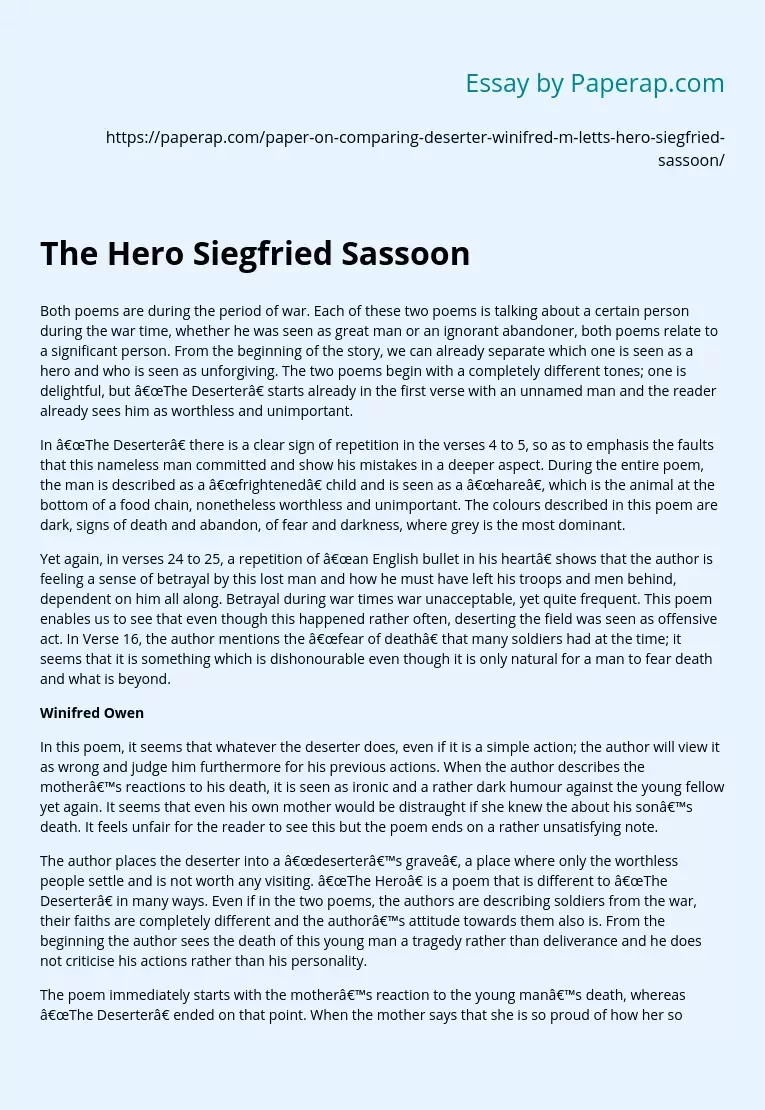The Hero Siegfried Sassoon
Both poems are during the period of war. Each of these two poems is talking about a certain person during wartime, whether he was seen as a great man or an ignorant abandoner, both poems relate to a significant person. From the beginning of the story, we can already separate which one is seen as a hero and who is seen as unforgiving. The two poems begin with completely different tones; one is delightful, but “The Deserter” starts already in the first verse with an unnamed man and the reader already sees him as worthless and unimportant.
In “The Deserter” there is a clear sign of repetition in verses 4 to 5, so as to emphasize the faults that this nameless man committed and show his mistakes in a deeper aspect. During the entire poem, the man is described as a “frightened” child and is seen as a “hare”, which is the animal at the bottom of a food chain, nonetheless worthless and unimportant. The colors described in this poem are dark, signs of death and abandon, of fear and darkness, where grey is the most dominant.
Yet again, in verses, 24 to 25, a repetition of “an English bullet in his heart” shows that the author is feeling a sense of betrayal by this lost man and how he must have left his troops and men behind, dependent on him all along. Betrayal during war times war unacceptable, yet quite frequent. This poem enables us to see that even though this happened rather often, deserting the field was seen as an offensive act.
In Verse 16, the author mentions the “fear of death” that many soldiers had at the time; it seems that it is something that is dishonorable even though it is only natural for a man to fear death and what is beyond.
Winifred Owen
In this poem, it seems that whatever the deserter does, even if it is a simple action; the author will view it as wrong and judge him furthermore for his previous actions. When the author describes the mother’s reactions to his death, it is seen as ironic and rather dark humor against the young fellow yet again. It seems that even his own mother would be distraught if she knew about his son’s death. It feels unfair for the reader to see this but the poem ends on a rather unsatisfying note.
The author places the deserter into a “deserter’s grave”, a place where only the worthless people settle and is not worth any visiting. “The Hero” is a poem that is different to “The Deserter” in many ways. Even if in the two poems, the authors are describing soldiers from the war, their faiths are completely different and the author’s attitude towards them also is. From the beginning, the author sees the death of this young man a tragedy rather than deliverance and he does not criticize his actions rather his personality.
The poem immediately starts with the mother’s reaction to the young man’s death, whereas “The Deserter” ended on that point. When the mother says that she is so proud of how her son dies, it shows how moved she is by his death and how even though she is full of sadness, she cannot help but be proud. But as the poem continues the tone slowly becomes more pessimistic and ironic than at the start. The writer describes how the officer lied about the entire ordeal and mimics the mother’s sadness.
The writer has had a drastic change of view from the beginning and now the dead soldier is no longer seen as glorious but rather pathetic, and the mother is seen as rather modest. This poem also ends on a slightly awkward note, explaining that no one cared about the way this young man perished “except that lonely woman with white hair”, showing somehow that she is the only woman that ever cared for her son. In both poems, the mothers are the ones that play the role of the appearing parent, this is most probably because mothers are seen as more sensitive and they are more patient towards the waiting for their son’s news.
Both stories end, with the mother proud, even though neither of the parents truly knows what happened to their sons. The two poems are quite ironic in a way and set an uncomfortable ending, something which keeps the readers on edge. Both poems successfully show us the difficulties of the war, and for many soldiers, it was terribly hard to deal with and many suffered and simply wished to travel back home or disappear from the battlefield.
The Hero Siegfried Sassoon. (2019, Dec 05). Retrieved from https://paperap.com/paper-on-comparing-deserter-winifred-m-letts-hero-siegfried-sassoon/

